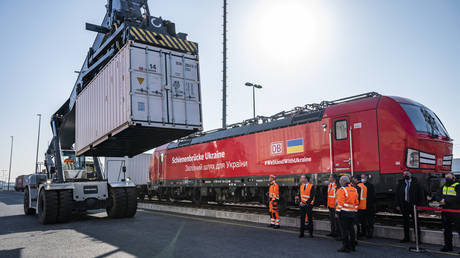
Deutsche Bahn had reportedly ceased charging fees for such services shortly after Russia launched its military operation against Kiev
Germany’s national railway company has quietly terminated the practice of hauling humanitarian aid destined for Ukraine free of charge, Der Spiegel reported on Friday. The decision was supposedly made due to the legal legal constraints on incorporated companies in Germany in terms of charity, according to the magazine.
Citing “railway circles,” Der Spiegel revealed that Deutsche Bahn “apparently” stopped providing free transportation for such goods starting January 1 of this year.
According to the report, in December 2022 humanitarian groups organizing the shipment of food, hygiene products, water purification equipment and generators to Ukraine received a message from Deutsche Bahn notifying them of the “provisional suspension of free transport.”
The letter reportedly clarified that, as an incorporated company, the German national railway operator had a certain ceiling in terms of how much it could spend on such charitable activities, according to Der Spiegel.
Several activists had allegedly petitioned the country’s transport minister, Volker Wissing, to intervene in the fall of 2022. However, those attempts were apparently unsuccessful, the outlet noted.
A ministry spokesperson was quoted by Der Spiegel as saying that the “railway bridges” were a private initiative of Deutsche Bahn, which picked up the tab for it single-handedly. The official added that the German government is currently looking at ways to maintain the free transportation of aid to Ukraine going forward. The article pointed out, though, that a “quick solution is not expected.”
As the outlet noted, the initiative was launched last year with much pomp, with DB-Cargo chief Sigrid Nikutta offering assurances at the time that her company was prepared to “maintain these ‘railway bridges’ for a very long time.”
According to Der Spiegel, Deutsche Bahn transported free of charge a total of 1,300 cargoes to Ukraine last year. This is estimated to have cost the railway operator up to €5 million.




